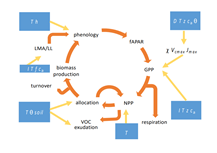Cross collaboration science meeting – LEMONTREE science team and Tsinghua University 110th Anniversary celebrations. Thursday May 13th 2021.
The LEMONTREE team in collaboration with Tsinghua University hold a joint science meeting to discuss Land system models; their known deficiencies and how the LEMONTREE project will be bringing new scientific theory to create the next generation models.
| Professor Yong Luo, Dean of Tsinghua University, welcomed over 1175 participants to today’s virtual science collaboration meeting, describing Tsinghua’s long history of climate science and current expertise. |  |
Co-hosts, Professor Sandy Harrison, University of Reading and Co-Director, Leverhulme Centre for Wildfires, Environment and Society and Dr Wang Han, Tsinghua University then introduced today’s agenda.
After a brief introduction to the LEMONTREE project, Sandy Harrison handed over to Professor Colin Prentice, FRS, Chair of Biosphere and Climate Impacts and Director, Leverhulme Centre for Wildfires, Environment and Society Imperial College London to discuss the main topic:
“Land-atmosphere exchanges of carbon, energy and water: new theory and next-generation models”.
| Colin started by outlining the problems with current ecosystem models and included as exemplars, 3 case studies showing how certain models performed poorly against atmospheric measurements.Colin concluded that optimality theory, combined with biophysical constraints is contributing to a new theory of ecosystem function. This, in turn will provide a robust quantitative understanding of the role of terrestrial ecosystems in the Earth system.
“In order to make better models, we should reconsider the core processes and then test them one by one.” |
 |
Dr Wang Han, Tsinghua University, continued the optimality discussions in her presentation:
“Predicting leaf economic spectrum from optimality theory”.
 |
Han showed that in her studies performed to date, the theoretical predictions and assumptions are well supported by actual observations.“This study provides a theoretical and empirical basis for modelling the environmental effects and the leaf economic spectrum. Furthermore it shows that optimality principles can underpin new theory for plant geography dynamics”. |
Huiying Xu, PhD student at Tsinghua University, shared her work on
“The coordination between photosynthesis and hydraulics”
| Huiying presented her work performed testing the hypothesis: Under optimal condition when transpiration reaches maximum, water loss through stomata should equal water transport through xylem to balance water demand and supply.Through theory and experiments in the Gongga Mountain, China, Huiying found that the prediction of site mean Huber value using optimality theory offers a promising approach to implementing hydraulics into the vegetation and land surface model.
“Huber value is the key trait that links between hydraulics and photosynthesis.” |
 |
Giulia Mengoli, PhD student at Imperial College, presented
“Ecosystem photosynthesis in land-surface models: a first-principles approach.”
 |
Giulia has performed a proof-of-concept study to apply an existing optimality-based model, the P model, at half-hourly timestep to include plant acclimation into land surface models. The extended model has been tested against flux tower measurements and against the CTESSEL land surface model across five different biomes.Comparisons show the suitability of the P model: “it provides a simple way to include plant acclimation within a land surface framework without having to store past data and without having to include new plant-functional-type-dependent parameters”. |
Koen Hufkens, post doctoral research assistant at ETH, presented
“Data and Code provenance: systematic and successive integration of data and analysis in LEMONTREE. “
| Koen’s presentation stressed the importance of a good data management and that coordination was key to avoid problems downstream. Koen emphasised what is needed; documentation, unit testing, stable reference code base and workflows in an agile framework. |  |
Sandy Harrison then led the Q&A on the presentation themes and on general discussions/ ideas for topics for further investigation.
The LEMONTREE project thank Professor Yong Luo, Dr Wang Han and Tsinghua University for arranging the science conference and all the presenters for their time today.
We also wish Tsinghua Universitya Happy 110th Anniversary!! |
 |
Further reading:
Wang Han paper: https://doi.org/10.1101/2021.02.07.430028
Huiying Xu paper: https://doi.org/10.1101/2021.03.02.433324
Giulia Mengoli paper: https://doi.org/10.1101/2021.05.07.442894
